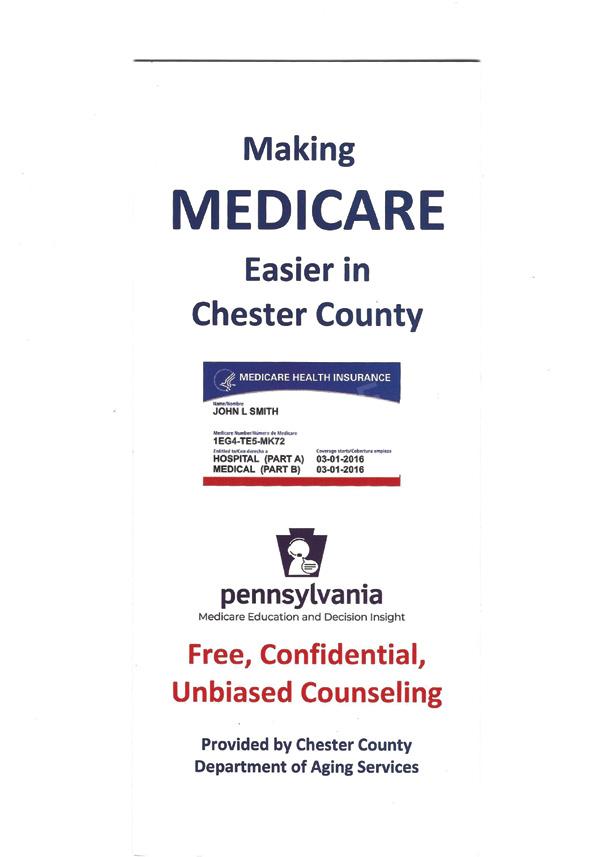
7 minute read
The 2022 Elections Including the Race for US Senate from Pennsylvania
By Larry L. Light
In the end, there will be no dearth of words to accurately describe the primary and general election campaigns this year to elect a new US Senator from Pennsylvania. There are so many adjectives that might attach to the event, words like historic, extraordinary, expensive, momentous, contentious, competitive, unprecedented, battleground and turbulent….and it seems like they may all apply.
The reason is that the Senate seat currently held by Patrick Toomey (R) is “open” because after serving two terms Sen. Toomey announced that he would not seek re-election. His successor will be chosen in the November 8, 2022 general election. Given the time it took to verify vote totals for Pennsylvania in the 2020 Presidential election, the vote count might not be completed for several days after the polls close.
The ballots prepared for the Commonwealth’s 8.5 million registered voters in November will be full of interesting, highly charged and competitive races. In addition to the open Senate seat, we will be electing a new Governor (Gov. Wolf is term limited), 18 Members of Congress in newly reapportioned districts, 25 State Senators in districts with new boundaries and 203 State Representatives on a map that will surely be changed significantly and likely face court challenges. The primary election, scheduled for May 17th, may even be delayed as those challenges are resolved. The elections held immediately after reapportionment are unique. Some incumbents from the same party will be forced to face off in the primary and in a few elections incumbents from different parties will contest the same seat in the subsequent general election. The process of drawing new legislative district lines with the goal of creating compact and contiguous districts will guarantee an interesting election cycle.
Most assuredly though, the crown jewel of 2022 election contests in Pennsylvania will be the open Senate seat. There are two politically strategic reasons. First, Pennsylvania is viewed as a competitive swing state when it comes to statewide campaigns, having produced winning margins for Trump (2016) and then Biden (2020). With Senators Casey (D) and Toomey in office the Senate seats have been politically split between the two parties since 2006. The question is whether the Biden victory has primed the pump enough to keep the Keystone state blue.
Second, control of the US Senate hangs in the balance. One third of the 100 Senate seats are filled every other year. With the current even split between the parties only providing a Democratic majority in the person of presiding officer Kamala Harris, the Vice President, the stakes for the 34 Senate races spread across the country in 2022 are extremely high. But none are higher than the race in Pennsylvania. Most political analysts agree that each party has four Senate seats in the category of highly competitive. At total of 26 Senate seats are considered safe and not likely to change party. Both national parties have declared Pennsylvania a key battleground in determining control of the Senate. But first, the Democratic and Republican candidates for the general election must win their own party primary election on May 17th.
Among the milieu of multiple primary candidates in both parties (each party has at least five), money spent on early television commercial buys, primary candidate debates, self funded candidates, candidates with tenuous claims to residency in the state, desperate campaigns from both parties to claim the open seat and a primary that could be delayed if the state or federal reapportionment plans are not finalized in time, it is already clear that the word physician will become a regular feature in campaign verbiage for both parties.
It’s not completely unknown to have a physician from Pennsylvania serve in the US Congress. Benjamin Rush signed the Declaration of Independence and was then elected to the Second Continental Congress.
Over the years several other physicians were elected, but always to seats in the House of Representatives. Physicians from other states have served with distinction in the Senate, most recently and probably most notably Bill Frist, MD (R-TN). Frist served two terms in the chamber and was the Senate Majority Leader for four years. Four physicians, all Republicans, are currently US Senators.
But there has never been a physician, a woman or an African American elected to the US Senate from Pennsylvania.
With physicians among the crowded primary fields of both parties, this high-profile Senate election in Pennsylvania could be the tipping point in so many ways. What are the chances? Well, among the declared candidates two months before the filing deadline there were three physicians running as primary election candidates. Valerie Arkoosh, MD, Montgomery County Commissioner Chair, was the only individual in either party who ticks both the physician and female candidate boxes before she announced her withdrawal from the Democratic primary on February 4th.
In any election, capturing the attention and interest of both voters and potential supports is the core goal of every campaign because candidates need contributors and funds to spread their message on the issues and the campaign needs a pathway to translate that engagement to votes on election day.
The issues in the primaries will be as broad in scope as the ranks of candidates themselves. And they will be issues of significance for any interested citizen. Given what is at stake, primary election candidates will have no problem exploiting the differences between their position and the other candidates from their own party, even if that will weaken the winning candidate in the general election. It becomes one step at a time, win the party primary first.
The core issues for the Senate campaigns are relatively clear cut. Maintaining or restricting fracking, how to address climate control, attacking or defending Roe v. Wade, dealing with the problems of immigration, election reform that will either make it easier or more “secure” for citizens to vote, relations with China and support for the 2nd Amendment versus restrictions aimed at curbing gun violence are all at the top of everyone’s issues list.
For female candidates Kathy Barnett (R) and Carla Sands (R) reforms to expand the role of women in the workplace is also a top tier issue. And for physician candidates Kevin Baumlin, MD, (D) and Mehmet Oz, MD, (R) the fight to bring the Covid virus under control will certainly be highlighted.
But the overarching issues are partisan control of the Senate and the filibuster. And that guarantees that this Pennsylvania election will have national implications.
It’s possible that the grind of a winter-spring primary election season may change the dynamics for candidates in both parties. Like Dr. Arkoosh, perhaps other candidates will withdraw from the race. Or more candidates may emerge before the filing deadline. Candidates’ petitions will be circulated for signatures between February 15th and March 8th. While no candidate is likely to have difficulty in reaching the minimum requirement of 2,000 signatures from fellow party members (voters can only sign one petition for a Senate candidate from their party), this is also the time period where campaign messaging, polling results and fund raising fall under more intense analysis. In fact, in this primary season close scrutiny will fall on not only how much money is raised, but how much money is supplied by the candidates from personal resources and how much money is received from out of state sources.
An astonishing aspect of this primary campaign is the energy and resources that several candidates have already invested in aggressively attacking the higher profile candidates from the “other” party.
Several candidates have made significant television commercial ad buys in the effort to improve their polling numbers. PACs are already contributing money to the candidates who will accept it and non-affiliated groups are running negative television ads to discredit otherwise viable candidates. In a very real sense, all of the descriptive words cited earlier will most certainly apply.
In addition to Dr. Baumlin, from southeastern PA, Democrats will have Lt. Governor John Fetterman and Congressman Conor Lamb, both from western PA, in the primary field along with Philadelphia State Representative Malcolm Kenyatta.
The Republican contenders include two women, Carla Sands, a former ambassador, and Kathy Barnette, a conservative commentator, along with attorney George Bochetto, Dr. Oz, former Lt. Governor candidate Jeff Bartos and David McCormick, a hedge fund CEO.
The opportunity to win an open US Senate race is a rare occurrence in politics. The list of quality candidates from both parties, the sustained evidence that the candidates are spending aggressively from their campaign or personal funds and the comprehensive media coverage are all strong indications of how critical the election of a US Senator will be both in Pennsylvania and the nation. And the primary election this spring is just the start.

Larry Light retired from PAMED as the Senior Vice President for Physician and Political Advocacy.
PATIENT
BROCHURES
Available through PA MEDI Contact the CCMS Staff to order brochures for your waiting room. Help your patients find proper, local resources to help them with Medicare enrollment.
Call the CCMS Office (610) 357-8531 or email chescomedsoc@comcast.net.









